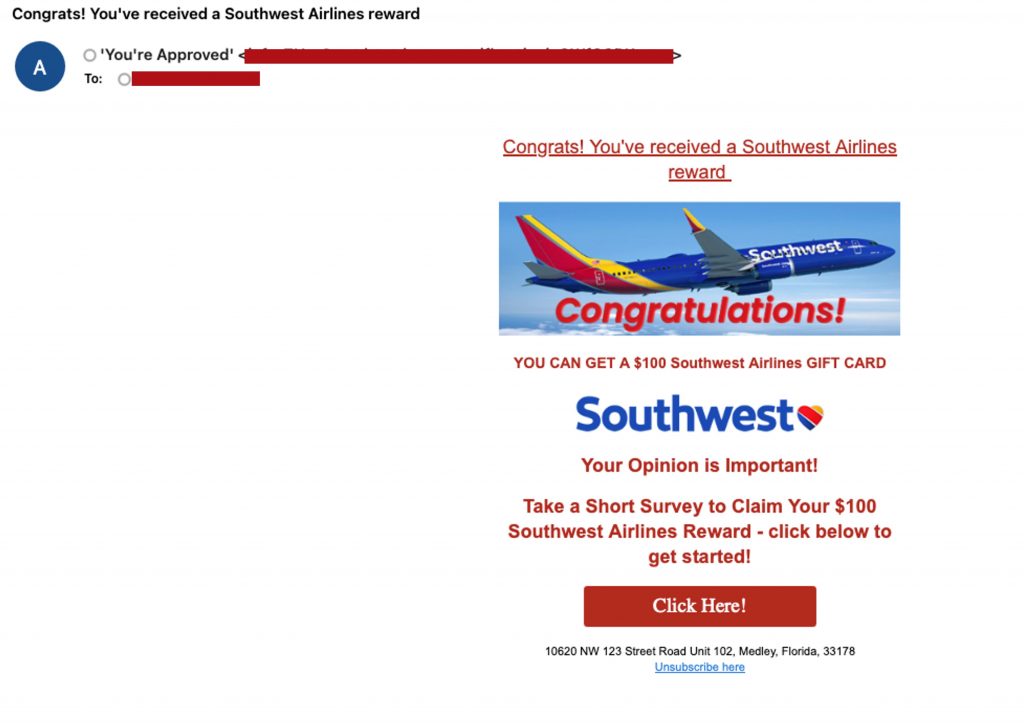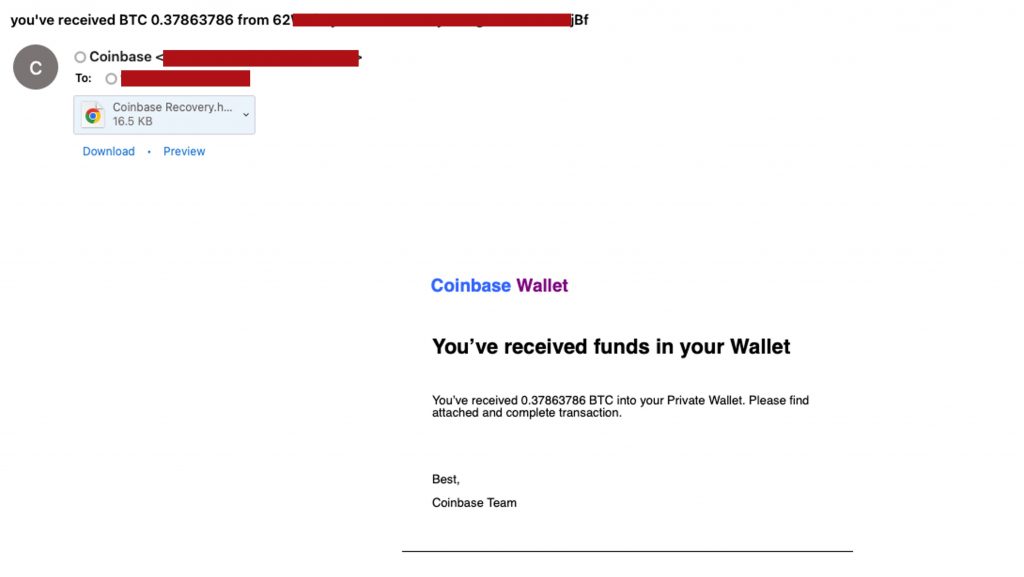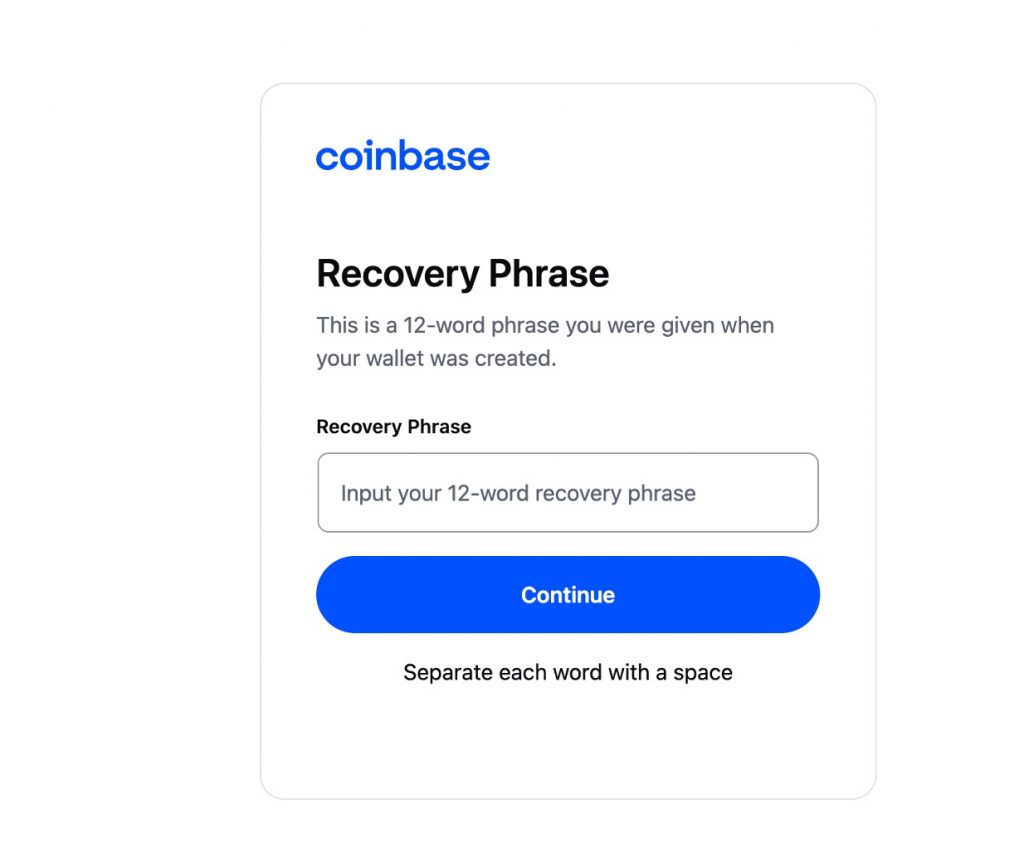This week we’ve found lots of phishing scams in which scammers are impersonating trusted brands, including Southwest Airlines, Coinbase, and USPS. Would you have been able to spot all these scams?
Phishing Scams
Impersonating trusted brands, scammers send text messages and emails containing phishing links, attempting to trick you into clicking under various pretenses, e.g. offering you a free gift, asking you to verify accounts, or prompting you to track a package.
What do they want? These links lead to phishing sites designed to record your personal identifiable informatin (PII), such as email address, credit card number, and Social Security number. With these credentials, scammers can drain your bank account, steal your identity, or commit any number of other crimes. Below are some examples.
Southwest Airlines
Have you started planning for a trip during the Holiday season? If you’re searching for the best deals on tickets, be careful of the latest Southwest Airlines phishing scam:

Falsely claiming that you can get a $100 Southwest Airlines gift card, scammers instruct you to fill out their online survey via the embedded button in the email. If you take the bait and click, it will take you to a fake Southwest Airlines page that will collect all the data you’ve submitted. Don’t let that happen!
Avoid Scam Sites for FREE
The truth is, there are lots of scams and scam sites on the internet and they’re getting harder to detect. For an easy and reliable method of detecting and avoiding scam sites, check out our free browser extension (Trend Micro ID Protection) and free mobile app (ScamCheck).
Both ID Protection and ScamCheck can protect you against scams, phishing links, risky websites, and lots more! If you come across something dangerous online, you’ll be alerted in real time so you’ll know to stay well clear
Coinbase
If you are using Coinbase or looking to invest in cryptocurrency, you should be on the lookout for bogus Coinbase emails:

Posing as Coinbase, scammers will send you a fake notification stating that you’ve received some bitcoins in your wallet and that you should open the attachment for details. If you click, a phishing html file will open, and it will ask you to enter your Recovery Phrase. With it, scammers can steal your crypto assets. Watch out!

Besides emails, scammers are also sending multiple fake text messages to deceive people.
USPS
Did you receive package notifications from USPS recently? Take a closer look and avoid scams! As we’ve written before, scammers get people to visit fake USPS tracking page and attempt to steal their PII. Example text template:
- The USPS package has arrived at the warehouse and cannot be delivered due to incomplete address information. Please confirm your address in the link. Ready to ship when changes are complete <URL> (Please reply Y, then exit the SMS, and reopen the SMS activation link. Or copy the link to Google Chrome to open) The USPS team wishes you a great day!
Sample fake USPS tracking page URLs (as of Oct 13, 2023):
- Usps[.]mybusipos[.]com
- Usps[.]drop-parcel[.]com
- Usps[.]drop-pp[.]com
- usps[.]safetycenter[.]vip
Note: Double check the web address — the only legitimate domain is usps.com.
Tips to Stay Safe Online
- Double-check the sender’s mobile number and email address. Even if it seems legitimate, think twice before you take any action.
- Never click on dubious links or attachments! Only go to official websites and apps to make purchases, update information, or track a package’s status.
- If you’ve accidentally revealed your PII somewhere, change your passwords immediately and inform your bank and/or other companies that scammers may contact them pretending to be you.
- Check if any of your PII has been leaked and secure your social media accounts using Trend Micro ID Protection.
- Finally, add an extra layer of protection to your devices with Trend Micro Maximum Security. Its Web Threat Protection, Ransomware Protection, Anti-phishing, and Anti-spam Protection will help you combat scams and cyberattacks.
If you’ve found this article an interesting and/or helpful read, please SHARE it with friends and family to help keep the online community secure and protected. Also, please consider leaving a comment or LIKE below.
0 Comments
Other Topics
